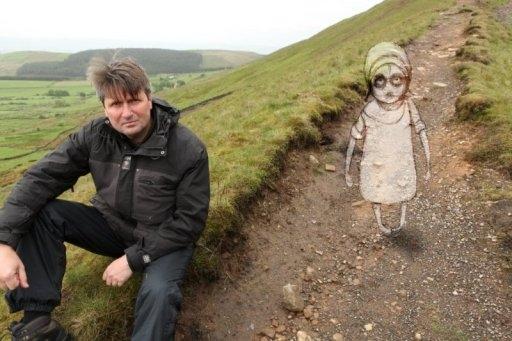A nine-year-old girl testifies in court. She’s clear, precise and damning. The case revolves around her testimony alone. All the accused – 10 of them, her family and neighbours - are declared guilty and executed. The girl is the only one of the family left alive. Thirty-two years later, the girl faces the same charges. Tried, she’s found guilty but the case goes to appeal. The girl was Jennet Device and the charge was witchcraft. This extraordinary, atmospheric and beautiful documentary told her story, the story of The Pendle Witch Child, the implications of the case and how it resonated. And still resonates.
In 1612, Jennet Device’s sister was out, begging. The pedlar she’d targeted wasn’t offering anything up, so she cursed him. Unfortunately for her, her family and other residents of Pendle, Lancashire the pedlar fell to the ground, stricken. He’d probably suffered a stroke, but she thought her curse had magically worked. Suddenly, she knew she was a witch.
Poet Simon Armitage presented the story of this event, the subsequent trials and ripples with a dry yet empathetic manner. Nothing was overstated, but his serious undertone drew you into a world where witchcraft was a day-to-day issue – to sympathise. He was helped by Phoebe Boswell’s stunning animations, which brought Jennet Device and Armitage side by side. The interweaving of the animation with the narrative made this programme very special.
 For Armitage (pictured right, on the former site of Jennet Device's family home), the story of The Pendle Witch Child is about life in an age of fear. James I came to the throne in 1603. The authorised Bible – an Anglican-Puritan co-operation – was published in 1611. As King James VI of Scotland, he had published his Daemonologie in 1597. For him, and for much of the post-Reformation establishment, the real demons were Catholics. As it was put here, Catholicism was a heathen religion this close to witchcraft. The tension between Catholicism and the new, institutional religion was underlined by the Gunpowder Plot of 1605 when an attempt was made to blow up Parliament.
For Armitage (pictured right, on the former site of Jennet Device's family home), the story of The Pendle Witch Child is about life in an age of fear. James I came to the throne in 1603. The authorised Bible – an Anglican-Puritan co-operation – was published in 1611. As King James VI of Scotland, he had published his Daemonologie in 1597. For him, and for much of the post-Reformation establishment, the real demons were Catholics. As it was put here, Catholicism was a heathen religion this close to witchcraft. The tension between Catholicism and the new, institutional religion was underlined by the Gunpowder Plot of 1605 when an attempt was made to blow up Parliament.
Lancashire, an outpost of Catholicism, was “full of troublemakers and subversives”. Witches and Catholics alike were fine catches for provincial magistrates looking to curry favour with the monarchy and the London establishment. Jennet Device’s sister declaring herself a witch was an invitation to round up not only her family, but members of the local Nutter family, known Catholics.
Of course, it didn’t stop there. Armitage found that the Pendle case was cited in Dalton’s Country Justice, published in 1618. This handbook for magistrates was used on the mainland and in the colonies. It said the Pendle trial made it OK to use the testimony of children in witchcraft cases. The 1692 Salem Witch Trials hinged on the evidence of a child. Nineteen people were hanged.
Jennet Device resurfaced in 1634 when she herself was accused of witchcraft. The accuser was a boy that went around churches pointing out witches in the congregations. His fantastic, barely credible story of encountering witches was wonderfully illustrated by an amazing animation (watch related video below this review). Although acquitted, Device is believed to have died in Lancaster jail.
Armitage posited that Device’s acquittal was to do with a raising of the standard of evidence – physical proof, not accusations alone, was needed. The Age of Reason was dawning. However, the documentary did not mention that England overall was in turmoil: the civil wars began in 1642, England was a republic between 1649 and 1660. As memorably depicted in the film Witchfinder General, this latter period was rife with accusations of and convictions for witchcraft. Witches were hunted in this wider context, yet it’s true that Robert Boyle’s, Francis Bacon’s, Isaac Newton’s and the other Restoration rationalists' search for explanations didn’t immediately halt the witchcraft trials. People still believed, but newly sceptical judges didn’t.
The conclusion that we still look for the equivalent of witches was inescapable. As Armitage strolled down east London’s Brick Lane, it became clear that other words may have taken the place of witch.
- Watch The Pendle Witch Child on BBC iPlayer















Add comment